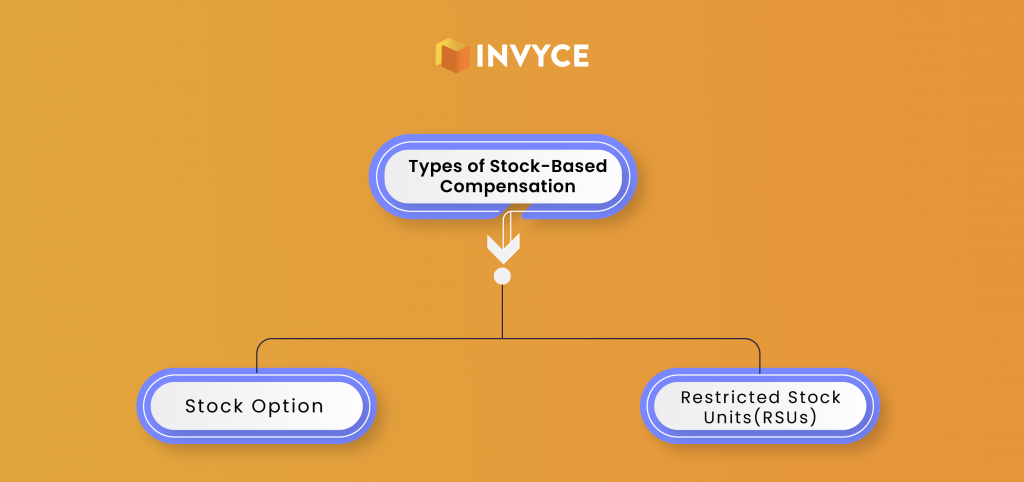08 Nov

The term stock-based compensation is a type of employee compensation in which you get a portion of the company assets upon vesting, like stock options. This article will cover what stock-based compensation is and how it works. We’ll also look at some advantages and disadvantages of using stock-based compensation.
What is Stock-Based Compensation?
Stock-based compensation (also known as equity-based compensation) is a type of employee benefit where employees receive shares of company stock instead of cash payouts. If your company offers stock options, you can buy shares at their current market price or sell them before they expire. That way, if the price goes up (or down), it impacts your share value. The stock-based compensation is recorded on the income statement as non-cash expenses under US GAAP.
Stock-based compensation intends to align the interests of employees with the company’s interests. It is a popular way for companies to attract talent and retain top performers. Employees are given stock options, restricted stock units, or performance-vesting shares in exchange for their services. These types of compensation plans are becoming increasingly popular among U.S. employers.
How Does Stock-Based Compensation Work?
The first step in understanding how stock-based compensation works is understanding what a share or stock is. A share of stock represents ownership in a company. When you buy a share or stock in a company, you own a piece of the business. You can vote on the shares and receive dividends if they are paid out. If the company goes bankrupt, you lose everything. When you join a company, you agree to give them some portion of your time and effort in return for a salary.
This type of compensation is used to reward employees for their performance and retain them as well. If an employee does well at work, they may receive more stock-based compensation than someone who doesn’t perform well on the job. However, if an individual leaves before receiving all his vested shares from his employer (which could be years later), those unvested shares will be worth less. The employees get shares benefits when they work for the business for a sufficient amount of time. After that, they can keep the shares forever or sell them to get cash.
Types Of Stock-Based Compensation
Stock-based compensation is the most common form of compensation in a public company. It can be divided into restricted stock units (RSUs) and stock options.

Stock Options
A stock option provides you the right to buy a number of shares at a set price over a period of time. An example might be buying 500 shares of a company’s stock at $50 at a discounted price. If the company’s stock rises to $60 per share before expiration, you’ll make a profit of $10,000. However, if the stock falls back down to $50 per share, you won’t get anything.
Restricted Stock Units (RSUs)
Restricted stock units (RSUs) are similar to stock options except that they don’t expire and are issued with some restrictions. These shares can be sold out only after fulfilling certain conditions. Restricted stock units pay you dividends on your shares once they’re vested and owned by you. As with any type of share, these dividends are based on how much time has passed since the RSUs were issued.
Advantages of Stock-Based Compensation
Stock-based compensation can be beneficial to you in many ways. Some are as follows,
- Employees are rewarded for their performance when employees perform well. This motivates employees to do better and work harder so they can benefit from their hard work.
- Employees share in the company’s success as part of a team effort which helps build camaraderie between coworkers and create loyalty because owning shares provides them with a feeling of ownership.
- When a company’s management is not the owner, they have the incentive to make choices that benefit them at the owners’ expense. Conversely, when someone is a business owner or manager, they frequently watch their spending.
Disadvantages of Stock-Based Compensation
There are a few disadvantages to stock-based compensation:
- Stock-based compensation is not guaranteed. If you’re thinking about participating in a stock option program and don’t have any other way of making money, remember that if the company goes bankrupt or decides to cancel your program, you could lose all or most of your investment.
- The value of the company’s stock price can go down and up (or even stay flat). This means that if your shares are worth $10 when issued but end up being worth only $5 after three years, those initial gains will be wiped out by their decline in value over time.
- Current shareholders’ ownership may be significantly reduced by an increase in the number of outstanding shares. Additionally, it may significantly lower the value of those already-issued shares.
Conclusion
Stock-based compensation is a great way to reward your employees without using cash. It is a type of employee compensation that is paid in the form of stock grants, stock options, and restricted stock. These rewards are usually earned depending on the performance of a company’s stock value, making them attractive to executives and board members.
Marjina Muskaan has over 5+ years of experience writing about finance, accounting, and enterprise topics. She was previously a senior writer at Invyce.com, where she created engaging and informative content that made complex financial concepts easy to understand.
Related Post
Copyright © 2024 – Powered by uConnect



Marjina Muskaan